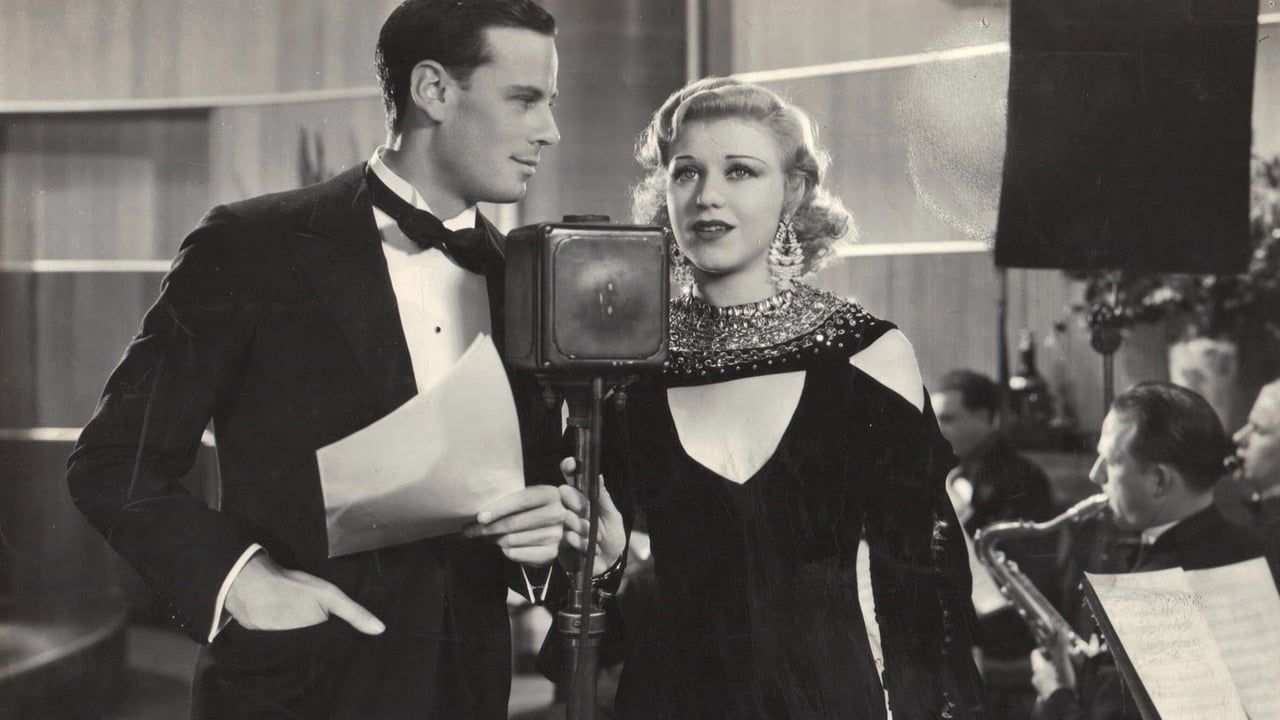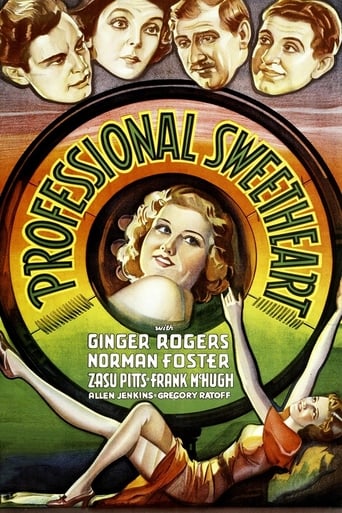

I'd been looking forward to this RKO programmer because it's by Maurine Watkins, a pretty smart writer who also was responsible for the play "Chicago," which became the movie "Roxie Hart," then the musical "Chicago." So she clearly knows about the value of publicity and the hypocritical nature of advertising and sponsorship. But those satirical targets are swiped at very broadly in this one, which keeps parading the name of the sponsor--Ippsie Wippsie--as if it were in itself hilarious. They're sponsoring a singing sweetheart, a dubbed Ginger Rogers, who personifies wholesome values and, predictably, is really the opposite of those values. I find Ginger's outbursts and shifts of mood unpersuasive and a little tedious, and she's surrounded by a supporting cast of Warners and RKO players who do what they always do--a simpering ZaSu Pitts, genial Frank McHugh, Brooklyn-streetwise Allen Jenkins, sputtering-in-a-foreign-accent Gregory Ratoff, swishy Franklin Pangborn, etc. Her leading man, Norman Foster, as a Kentucky farm boy who successfully woos her, is no great shakes, and Ms. Watkins also asks us to believe that a short time with him in the mountains would turn Ginger from a grasping spoiled brat who can't cook into a darling, kitchen-trained little wifey. The plot reversals are quick and unconvincing, and the bashing of the advertising industry is positively sledgehammer.
... View MoreThis wonderful cast interacts with absolute precision, whether walking around a room or interrupting each others' wisecracks. The script and direction meld into an enjoyable film. What's best is that not one character ever removes his tongue from his cheek. They know it's not serious and so do we. It's just pure fun.Some reviewers say the film is heavily gay; I beg to differ. While Pangborn gives a few swishes, it's not entirely clear which side of the street he walks on until near the end. There Pitts see him in his underwear, feigns surprise and then walks into his room and closes the door. The rest is left to our imagination, but gay isn't part of it.This is a film to see again and again to appreciate great plotting and directing.
... View MoreGinger Rodgers shines in a role that might have been written for Jean Harlow. She cracks wise, hurls insults, and dances around in her underwear. Zazu Pitts is priceless as the gushing and gullible small town reporter. Franklin Pangborn is more blatantly gay here than we normally get to see him. This movie touches on many aspects of celebrity that remain true to this day. The manipulation of a public image and the team of professionals that that requires. The all important "product", the selling of which is the reason for everything. This movie is also amazingly tolerant and socially progressive for it's time. The attractive black housekeeper's character is more of a friend to Ginger, who's footloose lifestyle she envies. Pangborn's character as one of her handlers is made obviously gay without degradation or judgement. Don't expect "Dinner at Eight", but "Professional Sweetheart" is sparkling and breezy pre-code fun!
... View MoreDespite this film having one of the more amazing groups of character actors for support, this is truly an awful film. It just goes to show you that no matter what talent you have assembled, it means nothing if the writing is bad--and boy, is it BAD! Even the combined supporting talents of Frank McHugh, Allen Jenkins, Akim Tamiroff, Franklin Pangborn, Edgar Kennedy, Sterling Holloway and others couldn't help Ginger Rogers elevate this mess to even mediocrity. The bottom line is the basic plot isn't at all believable and the dialog isn't any better. Normally when I watch older films, I am able to suspend disbelief and just enjoy, but this time it was a major chore not to just turn the movie off about midway through it! Ginger plays a radio star who is portrayed as so saccharine that it's impossible to believe that the public could stand her, though according to the film she's America's Sweetheart! Well, Ginger rebels against this as well, but her answer is to hang out in nightclubs and get drunk AND have sex (it's a "Pre-Code" film, so this sort of subject was NOT taboo in 1933). It's all very broadly acted and written and is supposed to be a sort of screwball comedy--the problem is that none of it is funny. What happens next and how everyone becomes happy in the end isn't really anything I want to discuss--I just want to never see this film again. It's a good thing Ms. Rogers had the Fred Astaire films to boost her career--if it was up to drivel like this, she never would have become famous!
... View More